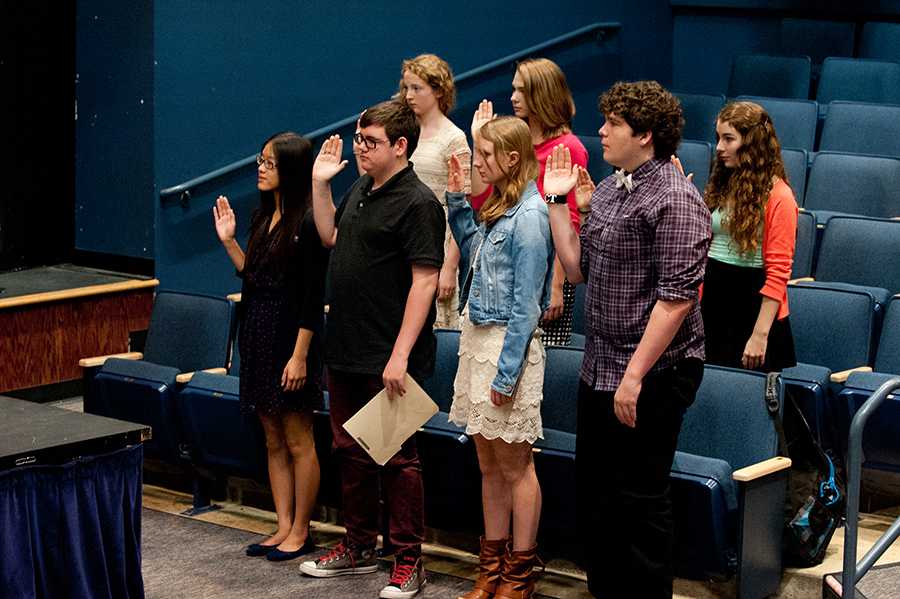Order in the (Youth) Court
October 15, 2014
“All rise. Johnson County Youth Court is now in session.”
These words mark the beginning of Youth Court, a voluntary substitute to the juvenile justice system available to individuals 18 and under in Johnson County. Through Youth Court the accused individual avoids having the charge published on their permanent record.
According to BVNW Youth Court sponsor Officer Marshall Thompson, Youth Court deals with any case that would be considered a misdemeanor if the student was an adult. It also has to be someone that is a juvenile with no record and cannot involve alcohol or drugs.
“[Youth Court is] for people who haven’t gotten in trouble before,” Thompson said. “So a person who does one thing and learns their lesson can go to Youth Court and still be clean, as far as record is concerned.”
To be admitted into Youth Court, the parent of the person against whom the police report is filed against has to contact the Youth Court coordinator. The coordinator will then schedule a day for the court case. Common cases include theft, battery, and trespassing.
Youth Court sessions are held in the Little Theater at BVNW during late arrival on Thursdays.
“I get [Youth Court] all set up and then the respondent and their parents show up…and meet with the defense attorney, which are, of course, the student volunteers,” Thompson said.
These volunteers are 18 or under and can serve as a jury member, prosecutor, defense attorney or judge. Senior Abhik Nag has been a part of this voluntary process serving as a jury member for five years. Though BVNW has a Youth Court program, Nag volunteers at the Youth Court held in the Johnson County Courthouse. After taking a mandatory class this summer, Nag has been involved in over 10 court cases where he has served as either an attorney or a judge each time.
“Being a judge is really easy for the court because all you have to do is read off a slip of paper and you have to give the prosecution and the defense their opportunities to present their sides of the case,” Nag said.
Nonetheless, Nag admits there are difficulties playing the role of a judge as well.
“The hard part about being a judge is going into the jury room and then taking what everyone has to say and then writing down eventually what everyone agrees to.”
However, Nag said at times individuals can be admitted for trifle reasons. A student was once admitted into Youth Court for throwing a pencil at another person. The respondent in this case or the person who committed the crime, only received minimum sanctions, according to Nag. Minimum sanctions are the least amount of penalties given to a Youth Court respondent. These include two jury duties and five hours of community service. Nag said other sanctions can include classes or even an apology letter.
“For example, if someone got into a fight with someone and they instigated the fight, typically the jury will force that person to write an apology letter because they started the fight,” Nag said. “They have to make sure that the person feels sorry for what they did.”
Prevention specialist at Johnson County Court Services and Youth Court coordinator Shala Bloomberg said the main goal of Youth Court is to take measures to assist the individuals in avoiding another offense in the future.
“One of the main goals of Youth Court is to make sure that we hold [the offenders] accountable for what they’ve done and to repay the community and to make sure that they are not going to have any further court involvement,” Bloomberg said.
She said that students who volunteer to be a part of the program benefit because they get to experience the legal system firsthand. Additionally, it prepares them for future careers such as law as well as improves their ability to develop arguments and speak in public settings, she said. Bloomberg said this experience can be beneficial for activities such as debate, forensics and drama.
According to Bloomberg, Youth Court provides students an opportunity to play a role in the lives of their peers.
“[The volunteers] get to help other students and sometimes they can help other students that are actually in their school,” Bloomberg said. “They are able to positively intervene in the life of their peers.”
Nag said that Youth Court has helped him improve as a public speaker and he has grown to appreciate the chance to be able to be a part of this legal process.
“[What I like about Youth Court is] being able to help a lot of these people, because not everyone that has come to Youth Court is like necessarily bad or has bad moral values,” Nag said. “I think being a [part of Youth Court] is a great way to try to assist these kids and teenagers.”






